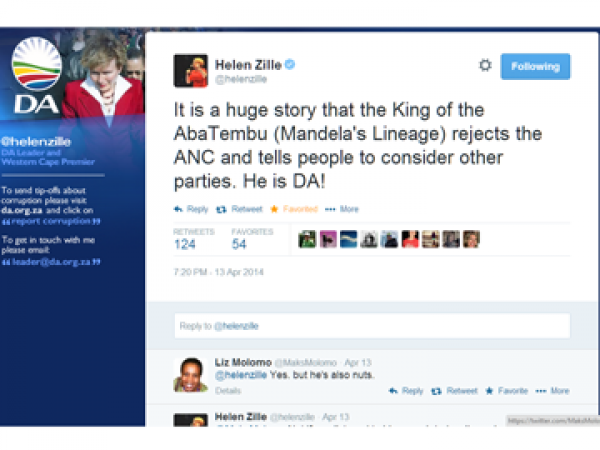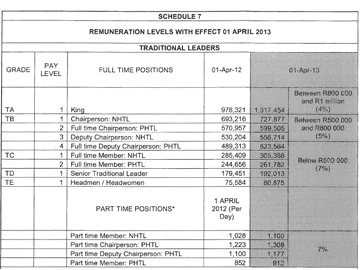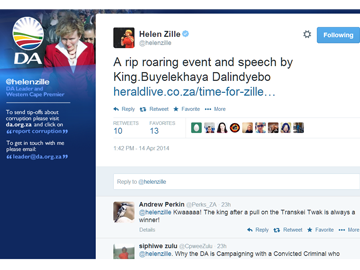

Screenshot of DA Leader Helen Zille’s Twitter feed.
22 April 2014
In the Eastern Cape, the Democratic Alliance is in bed with a despot convicted of homicide, attempted murder, kidnapping, arson and a range of other heinous crimes. Mandy de Waal asks whether the opposition is wise to hug a tyrant close to its breast, in the hope of defeating the ANC.
“It is a huge story that the King of the AbaTembu (Mandela’s Lineage) rejects the ANC and tells people to consider other parties. He is DA!” Premier Helen Zille proclaimed on Twitter on 13 April, underscoring her royal love affair with the troubled Buyelekhaya Zwelinbanzi Dalindyebo a Sabata, King of the abaThembu.
There is a dispute about whether or not the man’s a royal, but the leader of the opposition is right in stating that the DA’s embrace of Dalindyebo is a big story. Like her short-lived romance with Mamphela Ramphele, Zille’s courtship of Dalindyebo is a troubled affair. Unlike Ramphele, Dalindyebo’s narrative is besmirched with murder, assault, kidnapping, arson, regular plumes of marijuana smoke and more.
Dalindyebo’s shame is spelled out in his sentencing by the Eastern Cape High Court in December 2009. Case No. 267/2004 between the State and Buyelekhaya Dalindyebo shows that he was sentenced for crimes that included culpable homicide in respect of the death of Saziso Wofa, assault with intent to do grievous bodily harm, kidnapping, multiple counts of arson, defeating the ends of justice unlawfully and intentionally trying to conceal the death of Wofa.
The court document describes how Dalindyebo instructed Saziso Wofa’s father not to report his son’s death to the SAPS, and told Wofa Snr to conceal the true cause of his son’s death from mortuary authorities. The crimes were committed at Dalindyebo’s farm, Tyalara near Mthatha in the Eastern Cape over a period of eight months from June 1995 to January 1996.
Yet Zille gushed about Dalindyebo’s speech in what the Herald described as the “DA’s biggest rally ever in the Transkei.”
When a sceptical tweeter wrote that the king is “nuts.” Zille responded, “Not if you listened to his speech today, it was lucid, intelligent and democratic.”
But let’s try appreciate why the DA is cozying up to Dalindyebo, by examining the the role that traditional leaders play in SA politics and how important they’ve become in securing the rural vote.
In densely populated areas like Soweto or Khayelitsha the mobilisation of party politics is easier than than in remote rural areas for obvious reasons. The density itself, access to communications infrastructure, and party political networks (particularly those set up by the ANC), make mobilising the electorate simpler.
In rural areas geography and access create their own challenges. So royals, chiefs and headmen act as vital access points through which the ANC influences communities at risk of not voting, spoiling their votes, or voting for another party come 7 May.
The reach and influence of traditional leaders is significant. Business Day reports that some 18-million South Africans are “directly or indirectly affected by traditional leadership systems.” In his paper Consolidating Democracy and Building the Nation: Chiefs in South Africa, Patrick Harries, professor of African history at the University of Basel, states that there are close on 20 kings, paramount chiefs and queens in South Africa; and several thousand chiefs and headmen.
But the ANC’s relationship with traditional leaders is fraught. During colonial and apartheid times, chiefs and royalty were co-opted and remunerated for controlling citizenry in remote areas (although not all traditional leaders sold out). This realised a liberation movement that was at war with some royals and chiefs.
Post-apartheid the challenge changed, and became about reconciling the role and influence of traditional leaders in a liberal democracy with a progressive constitution. This, while still leveraging the influence of the royals in traditional and remote geographies. At once the movement that liberated South Africans and was at war with many chiefs and traditional leaders, now recognised that these traditional leaders had to be accommodated in the democracy.
But, Harries writes, as new municipalities replaced old apartheid structures, chiefs were “relegated to an advisory position and were subordinated to local elected councils.” This upset many of the chiefs whose old tribal authority became divided by new law.
“In the national elections of 1994 and 1999 it became clear to the ANC that the chiefs exercised an important influence over their followers during elections,” writes Harries. “In some rural constituencies, such as the Northern (Limpopo) province, chiefs contributed to an overwhelming ANC victory of close to 98%. The chiefs’ opposition caused local elections to be postponed three times. In 2000, chiefs again threatened to organise a boycott of local elections as these proposed to replace them everywhere with elected councils (to which they would serve as advisory officers).”
The ANC quickly learned that it had to co-opt traditional leadership to ensure ruling party sovereignty in provinces where traditional leaders have influence - which is every province, bar Gauteng and the Western Cape. But the ruling party was divided on the matter. “The discussion on traditional leaders cuts the ANC in half,” Albie Sachs once said.
The traditional leaders are well aware of the influence they wield and leverage this for self-interest. Six months ago traditional leaders petitioned Parliament for better remuneration, and a draft framework was presented by the Department of Traditional Affairs (DTA) to a parliamentary oversight committee on traditional affairs. The framework outlined demands for government-sponsored lifestyles resplendent with luxury vehicles, state-owned accommodation that was furnished, security details, mobile phones and an assortment of other allowances.
The Deputy Director-General of the DTA, Masenjana Sibandze, said that the provinces could foot the bill for these demands. The MPs present balked at the demands and said it made no sense for the traditional leaders to enjoy a lifetime of luxury in a state-sponsored mansion while living in communities plagued by poverty. A fracas ensued as the traditional leaders petitioned that they had been made public office bearers by government and must be recompensed just like MPs.
“From some of the MPs’ comments, I thought maybe I should be wearing ibheshu [a loincloth], coming here in a donkey cart. That’s what I could gather, that as a traditional leader, I should be living in a guqasthandaze [hut] or what is it that am I supposed to do?” a traditional leader shouted back at the MPs, reported Mail & Guardian.
In the Government Gazette of December 2013, an increase in the basic remuneration of traditional leaders was announced (effective retrospectively from 01 April 2013). The figures listed in the table below exclude sitting costs for the attendance of official meetings, seminars, conferences or workshops held by government. It also excludes transport and travel allowances, and subsistence costs.

In April this year, Thandi Modise announced that funding for traditional leaders in her region increased some threefold from R9.9 million for 2013/14 to R27 million for 2014/15.
Modise simultaneously reminded the traditional leaders how important it was that they and their constituencies vote in the coming elections. The premier then handed out 4X4 Ford Ranger Double Cabs to nineteen traditional leaders. Other perks for those with good lineage included vehicle schemes, mobile allowances, medical aid benefits and travel allowances.
Similar announcements of largesse were made in other provinces where royal and traditional influence looms large. These announcements were timely, given the February 2014 news that Zuma’s administration had axed the controversial Traditional Courts Bill. In reaction, traditionalists expressed bitter disappointment.
The bill would have given wide-ranging powers to traditional leaders, but since 2008 civil society and rural citizens banded together to stop traditional courts from being enacted into law. Traditionalists saw the bill as a means for restoring the dignity of traditional leaders, but constitutionalists were appalled that the bill undermined women’s rights, subjugated rural people’s will, and would have enabled traditional leaders to impose forced labour on their subjects. People living in a traditional leader’s jurisdiction would not have been able to opt out of a traditional court ruling, in terms of the bill. No doubt the increased remuneration and gifts afforded to traditional leaders in April, a few weeks ahead of the election, went some way to curtailing the disappointment at the dead bill.
With an appreciation of the historic tensions and complexities that bedevil the relationship between the ANC and traditional leaders, let’s examine the Eastern Cape royal that Helen Zille has embraced.
It is easy to see why Zille is so enthused by Dalindyebo, after all here is a ‘king’ that calls the president of South Africa “a Zulu boy”. Dalindyebo regularly lashes out at Zuma. The royal family has tried to smooth over relations in the aftermath. Dalindyebo’s family often refer to him as “unstable”, “delusional” or “crazy”.
In June 2013 he called Zuma and the ANC “corrupt hooligans.” The next month the king travelled to the Union Buildings to tell Zuma and declare to the world that he was joining the DA. While there, the AbaThembu King told eNCANews, “He (Zuma) flushes people like condoms. While he thinks he can flush kings. He flushes his own minister like condoms. Unfortunately I would say that the president has a habit of not condomising. We do not like people like that. His behaviour is a shower mentality.”
When asked whether he’d meet with Zuma to discuss his unhappiness with the president, Dalindyebo called the head of state a liar. “There is no reason to meet liars. He is just a councillor. I cannot be ordered to come to his office. He must come to my office - I am king unto him. He is just a Zulu boy.”
There was a time when Zuma and Dalindyebo met to discuss developments in the Eastern Cape, but no more. The pair fell out because the King of the AbaThembu believed the president favoured King Goodwill Zwelithini.
Then there was the matter that the presidency considered a request for Dalindyebo to be dethroned. The petition for the removal of Dalindyebo’s royal title was initiated in September 2012 by Thanduxolo Mtirara, chairman of the AbaThembu Royal Council.
“The royal family found Zwelibanzi Dalindyebo unfit to lead the cultural, customary and traditional ceremonies for the Great House including other royal houses,” Mtirara explained to Daily News. In a letter to Zuma, Mtirara complained that Dalindyebo brought the family into disrepute by smoking marijuana in public, and that the King didn’t respect his family. Zuma delegated the problem to Richard Baloyi, the former co-operative governance and traditional affairs minister who was sacked by the president shortly afterwards (July 2013).
Before exiting government, Baloyi pushed the challenge back to the royal family, saying that they had to sort the issue out. The matter of Dalindyebo’s position has still not been resolved, with the family split almost equally between declaring Dalindyebo deposed versus supporting him.
But whether or not Dalindyebo was a King didn’t stop Eastern Cape DA leader Athol Trollip from travelling to Bumbane Great Place outside Mthatha in July 2013. But before the trip, Trollip declared to the media, “I am not signing the king up to be a DA public representative, because he wouldn’t qualify.” By the time Trollip left Bumbane Great Place, Dalindyebo was sporting a blue T-Shirt.
Defending the DA’s flip-flop, Zille wrote a missive titled The King and I in the opposition’s online newsletter. “When King Dalindyebo took us all by surprise by publicly announcing that he would join the DA, we had two choices: to publicly accept him, or publicly reject him,” Zille wrote, adding that in a private meeting with Dalindyebo, Trollip explained all things DA to the royal, and advised him that the DA membership would be void if an appeal against the King’s criminal conviction failed.
“After a two-hour discussion, the King was more enthusiastic to join than ever. So he did. And we welcomed him,” Zille wrote, and added, “Politics involves converting opponents to support your cause, not creating impenetrable barriers to entry,” and then went on to say that this was politics “in the real world”, that this was “Realpolitik”.
In the real world Dalindyebo was found guilty of ten crimes that included killing 18-year old Saziso Wofa and almost killing Malandela Sontonase, Lunga Pama and Welile Dumo. The court sentence reveals what the ‘King’ did to the the young men whose lives he almost snuffed out.
According to the sentence ruling, “The three victims were undressed; their hands tied between their backs; they were prostrated on the floor; they were assaulted over a period of two hours; their assailants assaulted them by using sjamboks; they were made to ‘frog jump’ while the accused (Dalindyebo) was whipping their feet; when the accused (Dalindyebo) got tired he instructed other people to continue with the flogging ‘until they screamed’; the whipping caused their skin to open and left permanent scarring, and the assault continued until (the) ‘hut smelled of blood’.”
Uncontested medical evidence showed that if the three had not been placed on a tractor and taken to get medical attention, they would have died. Further undisputed evidence showed that Pama became “mentally deranged” following the flogging. In his defence Dalindyebo submitted that the three had been found guilty of crimes and were “disciplined” by the king (or by his order).
After listening to the testimony about the arson where the king evicted families from their homes and set these homes alight, the presiding judge of the Eastern Cape High Court, Judge J Alkema, stated, “The court sensed a feeling amongst the Tyalara community of despair and fear that if the King (the accused) is disobeyed or displeased, then the offender and his entire family will simply be evicted by setting their homesteads alight.”
On the count of culpable homicide, the judge stated: “Saziso was brutally assaulted to death and the accused’s (Dalindyebo’s) gross misconduct in his acts and behaviour as King of the abaThembu caused such assault and death.” It was submitted in court that after learning about Saziso’s death the King suggested the youth’s body be dumped in a nearby river. He then instructed the dead lad’s father to lie about the cause of death. But that wasn’t all. “As a last measure, and a chilling, but telling feature pointing to his total lack of compassion, the accused then fined Koto (Wofa, Saziso’s father) for the alleged misdeeds of Saziso.”
The judge found that Dalindyebo showed “no remorse what(so)ever. On the contrary, he creates the impression that he seriously believes he did no wrong.” The judge concluded: “I therefore believe his chances of rehabilitation are remote, if at all.”
During its testimony, the State referred to Dalindyebo as a “tyrant” and a “despot” who practiced a “reign of terror” over his subjects in what was described as “medieval tyranny”. Dalindyebo’s lawyers called the use of these terms inappropriate, but the judge upheld them, and said that the expressions aptly described the King’s reign. “He reigned with terror and fear and with total disregard to the Rule of Law.”
To date Dalindyebo has yet to serve his sentence. It has been some 18 years since Saziso Wofa died, but it appears increasingly unlikely that justice will be served in the case against the King. Dalindyebo appealed his sentence, and this appeal has been dragged out, with the King citing a lack of cash, and infighting between his lawyer and advocate. Media reports last year indicated that critical court documents have disappeared. There is no Google record of the DA ever taking issue with any of the actions the court found Dalindyebo guilty of.
The DA’s prize for trading in its liberal values and courting a despot like Dalindyebo? The hope that maybe it will gain a marginally bigger foothold in an ANC stronghold that to date has eluded it.

Eastern Cape election results 2009. Source: Wikipedia.
The moral of this story? There’s a quote by Billy Connolly that’s often attributed to Evita Bezuidenhout that goes: “Hypocrisy is the Vaseline of political intercourse.” The big story here is that Zille and the DA have no qualms receiving gifts and getting in bed with one terrible tyrant in the hope of defeating another.

‘Staunch’ DA king welcomes Juju at DispatchLive.
Why is the DA flirting with a bigoted criminal? by Gareth van Onselen at Business Day.
Arrive Alive unaware of King Dalindyebo’s dagga habit in Mail & Guardian.
Dalindyebo lets rip at Joyi funeral at DispatchLive.
Attribution: The writer thanks Gareth van Onselen for tracking down Dalindyebo’s sentencing record and making it publicly available.